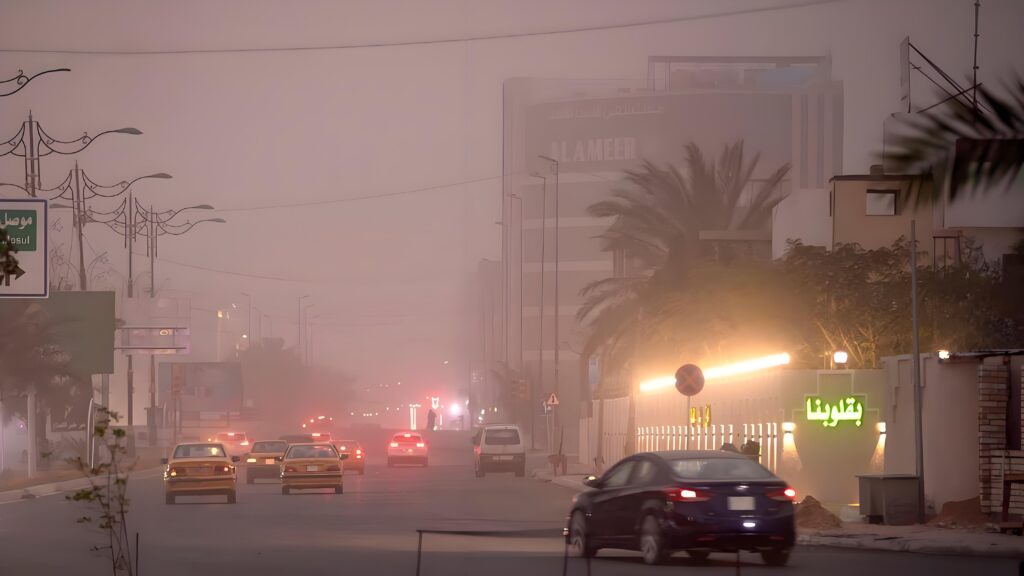
In 2024, the Arab region experienced extreme weather such as heavy rain and high temperature, as follows:
Extreme rainstorms
From April 15 to April 17, local time, many countries in the Middle East centered on the Strait of Hormuz suffered unprecedented super-heavy rainstorms. Dubai, a metropolis in the United Arab Emirates, was ravaged by four consecutive rounds of heavy rain within 24 hours. The 24-hour precipitation at Dubai Airport exceeded 160 mm, breaking the local record. The whole city was severely flooded, many buildings leaked, and traffic was completely paralyzed. Even the airport turned into a seaport, and planes flew through the water. The mountainous area at the border between the UAE and Oman received 200 mm to 302 mm of rainfall in 3 days, and the daily rainfall reached a thousand or infinite times the local rainfall in April, reaching 2-4 times the annual rainfall. As the thunderstorm clouds moved eastward, southeastern Iran and the western coast of Pakistan were also hit by heavy rainfall during the day on the 17th, and flash floods broke out in many places, and many deserts turned into large lakes.
Extreme heat
During the Hajj in Saudi Arabia from June 14 to 19, 2024, an extreme heat disaster event occurred. The highest temperature recorded in the Grand Mosque of Mecca was 51.8℃. On June 16 alone, at least 2,764 cases of high temperature were reported, resulting in the death of at least 1,301 pilgrims, most of whom were unauthorized pilgrims. In addition, the perceived temperature in many countries around the Persian Gulf exceeded the “extremely dangerous” critical value of 54℃ for many days, and the temperature in many places in Kuwait and Iraq exceeded 50℃. The temperature in the UAE reached the highest value ever recorded at 49.5℃.
Analysis of reasons
The extreme weather in the Arab region in 2024 mainly includes extreme high temperatures and extreme rainstorms. The reasons for their formation are analyzed as follows:
Causes of extreme rainstorms
Influence of low-pressure systems: Oman and the UAE are located in tropical areas close to the Indian Ocean. Spring is a season of rapid and drastic weather changes in the northern hemisphere, making the two countries vulnerable to strong low pressure from the Indian Ocean through the Arabian Sea and the Persian Gulf during the transition season. The Oman Meteorological Department said that this round of rainstorms was caused by a low-pressure system and was the most serious in recent years.
Climate change factors: Climatologist Friederike Otto pointed out that human-induced climate change has exacerbated the destructive rainfall in Oman and the UAE. As air and sea temperatures rise, evaporation in the Indian Ocean intensifies, and the moisture in the atmosphere increases, leading to more intense rainstorms. Global warming has caused abnormal atmospheric circulation, providing a favorable circulation situation for the formation of extreme rainstorms, making it easier for water vapor to gather in the Arab region and form heavy precipitation.
Soil and drainage facilities factors: In Oman, before this round of rainfall, it had experienced multiple rainfalls, the soil was soaked, and collapse and landslides were prone to occur. At the same time, Oman and parts of the UAE have insufficient drainage facilities and are unable to discharge a large amount of precipitation in time. Heavy rains have caused flash floods in these areas, causing many deaths and injuries.
Causes of extreme high temperatures
Geographic location and climate type: Most of the Arab region is in a low-latitude tropical desert climate zone. For example, Saudi Arabia is located at 13°-20° north latitude, and the Tropic of Cancer passes through it. In summer, it receives a lot of direct sunlight, and the sunlight energy is directly directed to the surface, causing the surface temperature to rise rapidly. The temperature is high and there is little rain throughout the year, and the summer is extremely hot.
Surface characteristics: The desert in the region is vast, and the surface is covered with sparse vegetation and a large amount of sand. The sparse vegetation makes the transpiration of plants weak and cannot effectively regulate the temperature; the specific heat capacity of sand is small, and it heats up quickly when absorbing the same amount of heat, resulting in excessive ground temperature, which in turn causes the temperature of the air near the ground to rise.
Global warming: The concentration of greenhouse gases in the atmosphere continues to rise, causing the temperature of the earth’s surface to rise. As a desert area, the temperature in the Arab region is more significantly affected by global warming, and record-breaking high temperatures have frequently occurred in recent years.
Urban heat island effect: The rapid urbanization in the Gulf region has made the buildings in urban areas very dense. The underlying surfaces of cities are mostly asphalt, concrete and other materials. Their specific heat capacity is small and they heat up quickly under solar radiation. At the same time, industrial production, transportation, residents’ lives and other activities in cities will release a lot of heat, forming an urban heat island effect, which further increases the temperature in urban areas.
About us: Superpangol, let the world be less hurt
Superpangol is a professional, efficient and caring team of disaster solution experts, dedicated to providing people with all-round rescue and help in various natural disasters and emergencies. With rich experience, professional skills and advanced equipment, we are always at the forefront of disaster relief, work together with the affected people to overcome difficulties, strive to minimize the losses caused by disasters, protect people’s lives and property, and rebuild a beautiful home. With professional ability and sincere heart, if you are facing disaster protection problems and urgently need help, please contact us immediately! We will do our best to support a solid sky for your safety.
